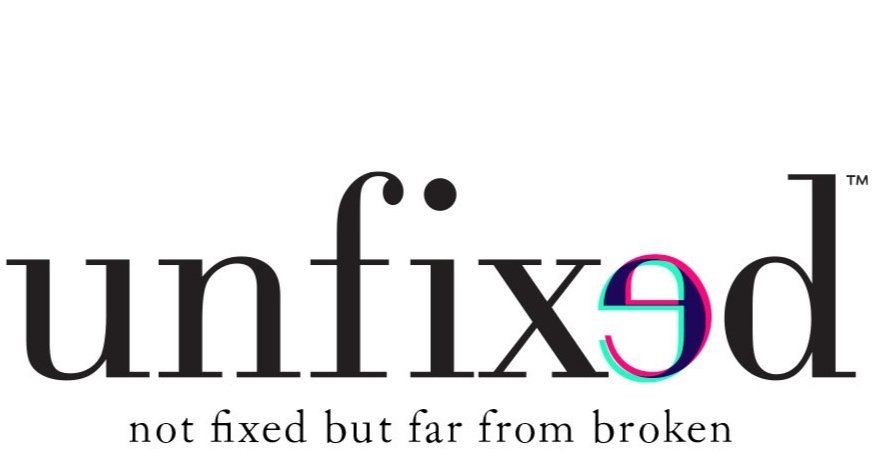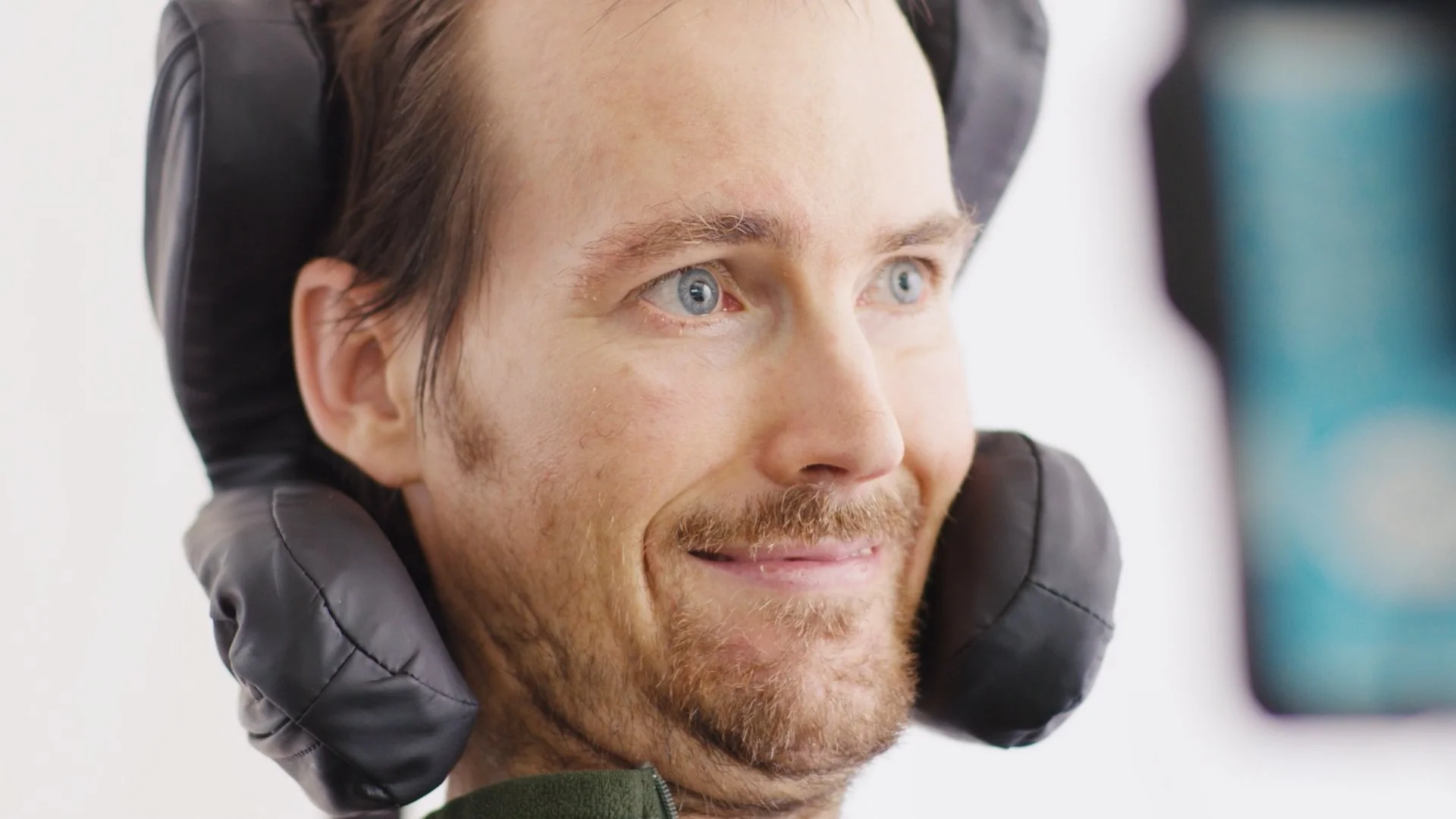forward
By Kimberly Warner
Let’s be clear up front: Dylan’s story isn’t the typical Hollywood redemption arc we’ve been conditioned to want. Our hero dies in the end. Not now, as I’m writing, perhaps not even yet as his book lands on shelves, but we know without doubt that his body ultimately succumbs to the ravaging wildfire that is ALS. And yet even as the physical diminishes, the spiritual expands. “He shall overcome” is a nuanced, quiet process in this instance—one that I argue is inversely and exponentially proportionate to the rapid decline of matter. A star collapses into itself and produces a supernova.
In September 2019, I had the privilege of meeting Dr. Dylan Shanahan, my first subject in the Unfixed documentary production. Dylan first reached out through a general casting search and contact form on my website. The idea of living “unfixed” is not that popular in our fix-it-obsessed, answer-driven culture. But Dylan resonated immediately and shared that a film dedicated to the topic is much needed in our society. After an exhaustive chase to cure my own rare, neurological disorder—Mal de Débarquement Syndrome—that had gutted my previous identity and left me isolated for years, I was thrilled to have found a comrade who understood the journey.
Dylan was also quick to elaborate on his willingness to participate within his abilities, stating, “I’m in a wheelchair and I speak through a tablet with an eye-tracking camera, Stephen Hawking style.” His sense of confidence immediately drew me in as he playfully added, “We must’ve been friends in other timelines, reuniting in this one to collaborate again. What kind of magic are we going to mix up this time?”
Our first day of filming together was a collision of excitement, fear, grief, and uncertainty—a typical grab bag of emotion for anyone living with chronic illness and disability. I sent Dylan my questions in advance so he could type out responses. Then during filming, his “synthetic voice” would read them aloud. There were many long periods of silence as he painstakingly retrieved each file, pulled it into the proper app, and selected the appropriate commands. He shared the next day that one of the extraordinarily long silences (over thirty minutes passed without a word) was because a film light interfered with his device’s ability to track his eyes. Dylan was unable to communicate ANYTHING during that period, so the crew sat patiently under the assumption he was slowly retrieving a file. He elaborates on this experience in his memoir and how, while he was rendered completely helpless with the eyes of an entire film crew on him, he chose to face it down as “another opportunity to practice equanimity.”
And therein lies the power, grace, and eternal sunshine of this remarkable human being. It is no wonder that early on in our friendship, I renamed him Vitamin D.
Then, in March 2020, the Coronavirus crisis descended. The pandemic interrupted the Unfixed filming schedule, but I was already too deeply invested in learning from the subjects. So, what do people with chronic illness do when life throws us curve balls? We adapt.
Instead of canceling filming until the pandemic resolved, I began sending prompts to the subjects, including Dylan; trained them (or their health aides) to record their responses with smartphones; and shared their lives in collective, edited episodes each month. As his care team’s availability shifted with time, I eventually called Dylan with a recording app and he played his response through the phone. It was a strangely intimate experience, feeling his quiet presence on the other end of the line whilst hearing his thoughts read by a computer-generated voice.
For two and a half years, I learned about the subjects’ lives. We investigated what it is like living with the uncertainty of chronic and terminal illness. We explored the challenges and the positives that can come from disability. We talked about food, sex, and the holidays. And we dove into more existential questions as well—what it means to “heal,” why our stories matter in this world, and whether we’d give up all we’ve learned from chronic illness in order to be healed.
And while the process for Dylan was never as easy as opening an app and speaking his thoughts, he participated in nearly every single prompt, crafting responses with utmost skill, self-reflection, honesty, and luminosity. Many of his insights made it into the series, but due to the nature of the short, curated episodes, volumes of his words collected dust on an external drive. I knew some of this would make it into a final feature film, but more of it would never see the light of day, and I grew more and more uncomfortable with this truth.
Dylan texted me in the fall of 2022, after a long period of silence unlike our usual communication cadence, sharing that things were “feeling heavy.” The motor neurons in his eyes had started to deteriorate. He had previously made the decision to end his life when communication was no longer an option and this date suddenly felt near. He shared, “What do I do with my time with only six months to a year left?”
And that’s when the lightbulb illuminated, spotlighting my hard drive full of Dylan’s wisdom.
Due to the rapid deterioration of Dylan’s eyes, the revision phase of his manuscript required some creative adaptation. Unable to write additional material, Dylan connected me with his inner circle—important colleagues, friends, and family members—who could illuminate additional parts of his story. I uploaded each new interview onto a private YouTube playlist so Dylan could review, and mostly bask in the profound relationships he nurtured throughout life. He no doubt felt maddening frustration during these screenings any time he heard part of his story told inaccurately and without the ability to make corrections—the level of surrender and trust Dylan practices throughout every moment of every day is more than most must face in an entire life.
Reading Dylan’s words, we join him in the ruthless and beautiful mess of it all—drawing meaning from what is not said as much as what is. In many ways, Dylan’s memoir is a powerful Zen kōan—a thought tool deliberately designed to inject “great doubt” into the mind. As renowned Sanbo Kyodan teaches, and Philip Kapleau illustrates, “A kōan is unsurpassed for breaking asunder the mind of ignorance and opening the eye of truth.”
Like a kōan, Dylan’s life invites us to simply observe, marvel at its contrast, and consider its teaching. His memoir asks that we drop the parts that want tidy narratives with pain-free understanding, and instead honor our stories with a contemplative heart where doubt and clarity, failure and success, fear and love exist simultaneously.
Dylan’s dream to heal others is now manifest—his life story an ineffable and vital prescription to potentiate and accelerate your own Liberation of Being.



